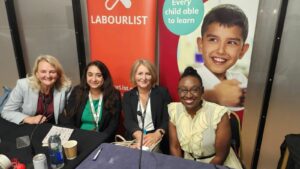By Arti Sharma, CEO, nurtureuk
Nurtureuk hosted its first fringe event at the Labour Party Conference in Liverpool this month and how heartening it was to be in a room full of individuals who absolutely get that ‘happy children learn better’.
The event was chaired by Anne Longfield CBE, Chair of the Commission on Young Lives, and I was joined on the panel by Lib Peck, Director of London’s Violence Reduction Unit (VRU), and Cllr Anntoinette Bramble, Deputy Mayor of Hackney and Cabinet member for Education, Children and Young People. My fellow panellists couldn’t have been any clearer about the desperate need for an education system that truly values, respects and nurtures all our children and young people.
As Anne outlined: “An increasing number of children are falling through the gaps in education and not surprisingly it’s the most vulnerable children who are the most affected”. We now have a quarter of children – that’s one day in ten who are persistently absent from school. She also highlighted that we are seeing more and more children being suspended or excluded as they can’t cope in the classroom. Surely, this can’t be right and an accepted state of being for our children.

Lib Peck shared how she took a group of young people (part of the VRU’s Young People’s Action Group) to share their diverse views on the current and future education system and it was clear that culturally we fail to talk to young people about issues that affect them directly.
Lib said: “Children and young people can’t thrive in systems that are unadaptable or inflexible – what young people want to see is more emphasis on mental health, relationships, safe spaces and the ability to express themselves and a more rounded education system”.
The VRU team are acutely aware of the dangers of exploitation that can occur during the hours of 3-10pm when children are not in school.
Cllr Bramble represents Hackney, where nurture began over 50 years ago. As a SENCO in her previous working life, she completed nurtureuk training in the Theory and Practice of Nurture Groups. So she truly understands that “education only works if children feel loved, safe, secure and happy”. She further pointed out that “academic accolades and great results are not as impactful if we don’t have well-grounded human beings that feel confident with hope”.
As the panel highlighted, an inclusive education system is a vital part of a successful society that allows children and young people to truly flourish and ultimately results in better outcomes for us all.
I believe that nurture is the way to create that system.
Nurture is a tried and tested, proven way of relating to children – based on established principles – that builds up their self esteem, develops their social and emotional skills and ensures they are ready to learn. It centres on identifying and meeting children’s social and emotional needs. Happy children learn better. And children can’t learn effectively if they don’t have the right social and emotional skills to do so.
When schools do nurture well, and pupils’ SEMH needs are identified and addressed, the effect is transformative. Attendance improves, exclusions reduce and behaviour and attainment is better. But sadly, nurture is not yet the norm.
And it does require dedication, commitment and consistency.
We speak to teachers every day who tell us that our programmes are exactly what they’ve been looking for – and they haven’t arrived a moment too soon. I’m thinking particularly of those schools participating in our INS Programme funded by the VRU – who are really struggling in the aftermath of some horrific situations and who are desperately searching for a way to properly support their pupils and ensure that despite everything they can still get through the school gate, they can still come into the classroom, and they can keep learning.
When a school adopts nurture, this is what happens, and the school becomes a place people truly want to be – both children and teachers. I was in a school in London just recently where the headteacher spoke powerfully about how nurture had turned things around. How exclusions were lower than ever, how attendance was where it had never been before, where relationships with parents and amongst staff were blossoming.
That’s why we’re calling for teachers to be properly trained, supported and required to identify and meet children’s social and emotional needs.
As we closed our party conference session, the packed room of attendees shared our collective vision and said they felt hopeful that a future where inclusive education and nurture could be the norm was a future worth fighting for.
By Arti Sharma, CEO, nurtureuk

